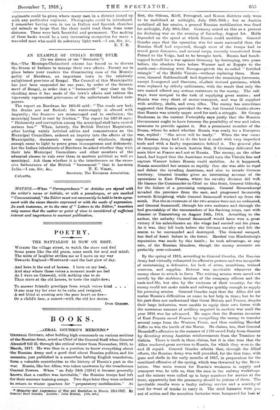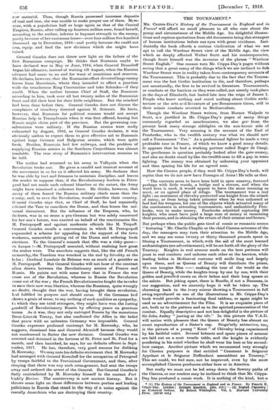BOOKS.
GOURKO'S MEMOIRS:*
'Onitsam, GM:TRIM; after-holding high commands on various sections -of the Russian front, acted as Chief of the General Staff when General Alexeieff fell-ill, through the critical winter from November, 1916, to March, 1017. '-He--was thus in a position to know everything about -the Russian Army and a -good deal about Russian politics, and his memoirs, just published in. a somewhat halting English translation, -form a valuable contribution to-the history of Russia's part in the -war. Russia, like-her Allies, was taken unawares by the treacherous Central Powers. When " on July 24th [1914] it became generally known that a conflict was inevitable," the Russian troops had left for their-summer training camps. Two days later they were ordered te return to winter quarters for " preparatory-mobilization." At Memories and Impression of War -aritl Mediu/ion itt /Man. 1914-1017. By General Basil Gourko. London : John ]Hurray. [18s. net.1 first, the Odessa, Kioff, Petrograd, and Kazan districts only were to be mobilized at midnight, July 20th-30th ; but as Austria mobilized all her armies, a general Russian mobilization was fixed for midnight," July 30th-31st. Germany seized on this as a pretext for declaring war on the evening of Saturday, August 1st. Mubh depended on the speed at which Russia could mobilize. General Gourko says that the operation was far more successful than the Russian Staff had expected, though most of the troops had to travel great distances, and several corps, recently transferred from Poland to the Volga, had to be brought back. Russia had handi- capped herself for a war against Germany by destroying, two years before, the obsolete forts before Warsaw and at Zegrgie to the north-east--forming with Novogeorgievsk the so-oalled " fortified triangle " of the Middle Vistula—without replacing them. More- over, General Sukhomlinoff had deprived the remaining fortresses, except Ivangorod and Osovietz, of.their trained garrisons, which were replaced by elderly militiamen, with the result that only the two-named offered any serious resistance to the enemy. The rail- ways were unequal to the task of supplying great armies ; and Russia was very short of motor-transport, and was ill supplied with artillery, -shells, and even rifles. The enemy has sometimes suggested that Russia provoked the war, but General Gourko shows that Russia was utterly unpro erect for such a struggle. Sir George Buchanan in the current 'Fortnightly says justly that the Russian Government ought to have foreseen the possibility of war and taken measures to provide against it. But a prominent member of the Drama,--whom he asked whether Russia was ready for a European war, replied : "She never -will be ready." When the war cams the Russian Army had to do the best it could with very imperfect -tools and with a faulty organization behind it. The general plan of campaign was to attack Austria first, if Germany delivered her main blow at France and not at Russia. The enemy, on the other hand, had hoped that the Austrians would turn the Vistula line and capture Warsaw before Russia could mobilize. As it happened. Russia assembled her armies so rapidly that she was able to repel and defeat the invading Austrians, and also to invade German territory. General (Iourko gives -an interesting account of the operations in East Prussia, where his cavalry division did well He blames the Commander-in-Chief on this front, General Gilinsky. . for the failure of a promising campaign. General Rennenkampl invaded the :province • from the east, 'and progressed favourably towards -Konigsberg, while General Samsonoff worked up from the south. But the movements of the two armies were not oo-ordinated, and General Samsonoff, through his own rashness and through the bad generalship, of the commanders of his flanking corps, met with disaster at Tannenberg on August 28th, 1914. According to the author, the unlucky General Samsonoff would have won a great victory if his subordinates on the wings had carried out his plans. As it was, they fell beak before the German cavalry and left the centre to he surrounded and destroyed. The General escaped, but died:of .heart failure in the forest. Marshal von Hindenburg's reputation was made by this battle ; he took advantage, at any rate, of the Russian blunders, though the enemy accounts are probably. over coloured.
By the spring of 1915, according to General Gourko, the Russian Army had virtually exhausted its offensive powers and was incapable of maintaining a defensive, for lack of arms, munitions, trained reserves, and supplies. Retreat was inevitable whenever the enemy chose to attack in force. The retiring armies were saved not merely by the stubborn heroism of the company officers and the rank-and-file, but also by the vastness of their country, for the enemy could not make roads and railways quickly enough to supply his pursuing armies. General Gourko says that the Allies did not realize Russia's difficulties or come to her help in time ; but he for his part-does not understand that Great Britain and France, despite their large industries, were unable to equip their own forces with the enormous amount of artillery required in modern war until the year 1916 was far advanced. He 'urges that the Russian invasion of East Prussia saved France by compelling the enemy to transfer several corps from the Western Front, and thus enabling Marshal Joffre to win the battle of the Marne. He claims, too, that General Brrussiloff's offensive in the summer of 1)16 saved Italy from disaster by diverting strong Austrian reinforcements from the Trentino to Galicia. There is truth in these claims, but it is also true that the Allies rendered great services to Russia, for which they were in the -end ill repaid. General Gourko admits that, through the Allied efforts, the Russian Army was well provided, for the first time, with guns and shells in the early months of 1917, in preparation for the combined offensive of the spring, which was thwarted by the Revo- lution. One main reason for Russia's weakness in supply and transport was, he tells us, that the men in the railway workshops and the miners were called up in large numbers for service at the -front, apparently lest the peasantry should be jealous of them. The inevitable results were a faulty railway service and a scarcity of 'coal for 'want of trucks to carry it. The steel furnaces were pus out of action and the munition' factories were hampered for leek of
raw material. Thus, though Russia possessed immense deposits of coal and iron, she was unable to make proper use of them. Mere- over, with a population half as large again as that of the Central Empires, Russia, after calling up fourteen million men, found herself, according to the author, inferior in bayonet strength to the enemy, partly because of her enormous losses—over four million five hundred thousand up to December, 1916—and partly because she could not ram, equip. and feed the new divisions which she might have raised.
General Gourko does not throw new light on the failure of the first Rumanian campaign. He thinks that Rumania ought to have declared war in May or June, 1916, when General Brussiloff began his offensive, instead of waiting till August, when the Russian advance had come to an end for want of munitions and reserves. He declares, however, that the Rumanian effort diverted large enemy forces from Macedonia, where they intended to effect a junction with the treacherous King Constantine and take Salonika—if they could. When the author became Chief of Staff, the Russians, according to him, took over all but twenty miles of the Rumanian front and did their best for their little neighbour. But the mischief had been done before then. General Gourko does not discuss the complaints of treachery directed against M. Stiirmer. He hints, however, that Rumania for political reasons would not accept Russian help in Transylvania when it was first offered, fearing lest Russia might claim part of the province. But the governing con- siderations were military. If the Russian armies were really exhausted by August, 1916, as General Gourko declares, it was obviously useless to expect them to give effective aid to Rumania against large German and Bulgarian armies, which were quite fresh. Besides, Rumania had few railways, and the problem of supplying Russian armies in the Sonthem Carpathians was almost insoluble. The true story of Rumania's intervention remains to be told.
The author had returned to his army in Volhynia when the Revolution broke out. He gives a candid and ironical account of the movement in so far as it affected his army. He declares that he was able by tact and firmness to maintain discipline, and leaves the reader to suppose that, if the Revolutionary leaders in Petro- grad had not made such colossal blunders at the outset, the Army might have remained a coherent force. He thinks, however, that many of them feared the Russian military chiefs more than the enemy, and, to save the Revolution, would sacrifice their country. G mere' Gourko says that, as Chief of Staff, he had repeatedly advised the Tsar to conciliate the Duma, and thus lessen the uni- versal discontent. But the influence of the Empress, who, he declares, was in no sense a pro-German but was solely concerned for her son's future, was exerted on behalf of the reactionaries like M. Protopopoff and against moderate officials like M. Trepoff. General Gourko recalls a conversation in which M. Protopopoff expounded a scheme for appealing for the support of the town workmen, meanwhile getting rid of the Duma and ordering fresh elections. To the General's remark that this was a risky game- r° banque !—M. Protopopoff assented, without realizing how great the stakes were. The anecdote suggests that, like the old French monarchy, the Tsardom was wrecked in the end by frivolity at the hchn : Cardinal Lomikie de Brienne was as much of a gambler as Protopopoff. But General Gourko will not hear of the contrast often drawn between the Revolutionary armies of France and Russia. He points out with some force that in France the war arose out of the Revolution, whereas in Russia the Revolution came out of the war ; the French Revolutionaries fought the invader to save their new-won liberties, whereas the Russians, quite wrongly no doubt, thought that the war, having brought them revolution, h ul fulfilled its purpose and should cease. If the Germans had f hown a grain of sense, to say nothing of such qualities as sympathy, t3 which they are total strangers, they might have won tho lasting goodwill of Revolutionary Russia by offering peace on generous terms. As it was, they not only outraged Russia by the monstrous Brest-Litovsk Treaty, but also confirmed the Allies in the belief that peace with an unbeaten Germany was impossible. General Gourko expresses profound contempt for M. Kerensky, who, he suggests, dismissed him and General Alcxeieff because they would not condescend to flatter the new dictator. General Gourko was arrested and detained in the fortress of St. Peter and St. Paul for a month, and then banished, he says, for no definite offence in Sept- ember, 1917. He has, therefore, very good reasons for disliking M. Kerensky. We may note his definite statement that M. Kerensky had arranged with General Korniloff for the occupation of Petrograd by troops faithful to the Provisional Government, and then, after denying that there was any such arrangement, bad sent the troops away and ordered the arrest of the General. But General Gourko is flatly contradicted by M. Kerensky himself in the current Fort- iiightly Review.. The controversy is now ancient history. But it throws some light on those differences between parties and leading politicians in Russia that stand in the way of a union against the rascally Anarchists who are destroying their country.











































 Previous page
Previous page